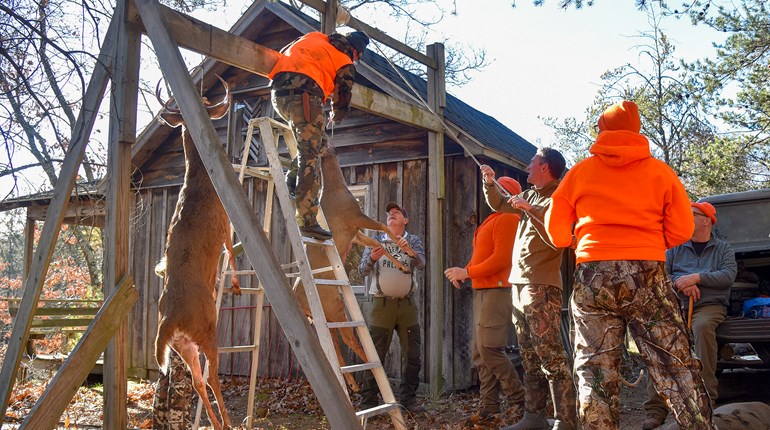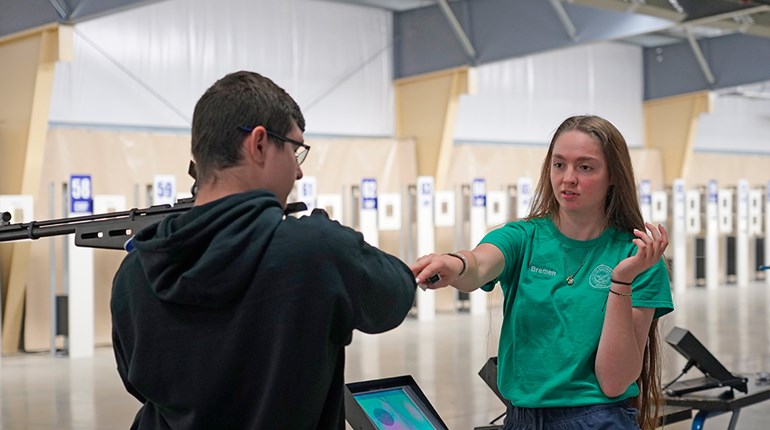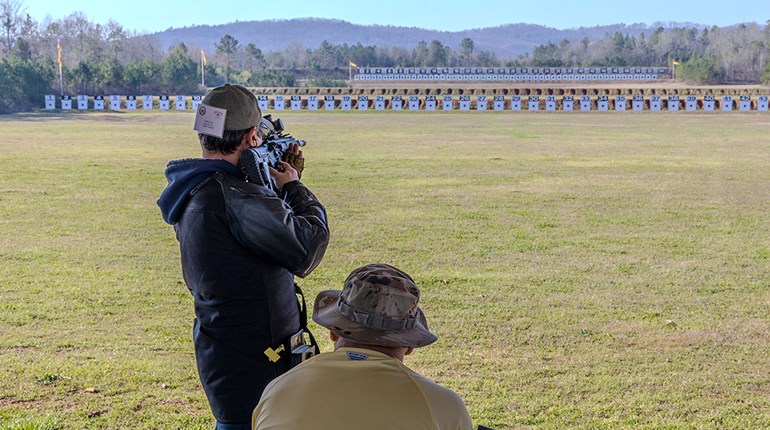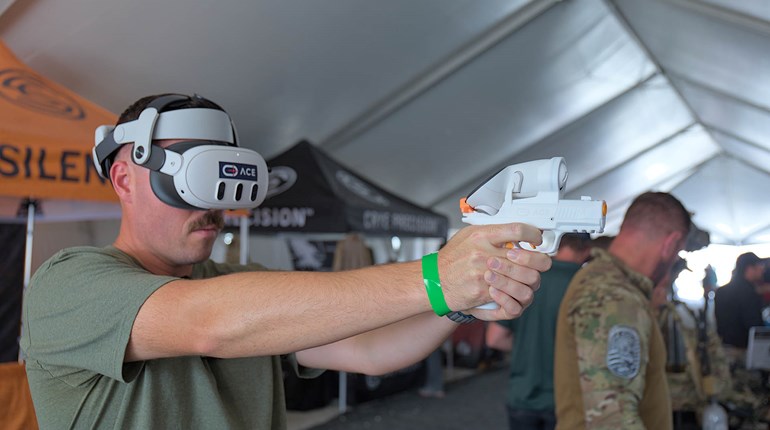
Subtle monuments at the Millwood Hunt Club gently remind members that they’re hunting deer in bottomlands inherited by fate and made memorable by fellow Alabamans who inspired legends.
The most obvious monument is a 19th-century millstone at the entrance to Millwood’s grounds, 2,400 acres of lowland pine, cypress, briars and hardwoods along the northern shores of the Black Warrior River. The stone once ground grains in nearby grist and flour mills, which were powered by water siphoned from manmade lakes fed by artesian wells. The spillway from those lakes also powered a vertical sawmill and a giant press for baling cotton.

After arriving and touring the guesthouse, you notice a no-frills picture frame holding a playing card, a 4 of spades. Handwritten block letters tell its story: “This card won Millwood. November 7, 1962. George Searcy Wright, Camille Wright Cook.”
As siblings, Wright and Cook were two of seven nieces and nephews of Wiley Croom Tunstall, an Alabama lawmaker who acquired former cotton plantations and other lands much like Millwood. Tunstall bought Millwood in 1882. Eighty years later, when his descendants decided to divide the family’s holdings, they assigned each of their four properties to a playing card: more specifically, the ace of spades, 2 of spades, 3 of spades and 4 of spades. And then they drew cards to determine who got title.
Camille Cook, now 93, drew first, and pulled that 4 of spades, which entitled her clan to Millwood. Its lands had always been too wet to grow cotton, and in the 1940s an uncle cleared it of every tree he could turn into lumber. His effort was so thorough that the land would need at least another generation to resume even modest lumber production.
But Lord, the nutritious regrowth from those cuts generated white-tailed deer, and Camille’s brother couldn’t have been happier with the card she pulled. Judge George Wright had grown up hunting deer with his great-uncle Wiley, and that meant baying hounds, dog handlers, huntmasters, line captains, double-barreled shotguns, and the camaraderie of hunt-club members from Tuscaloosa, Birmingham and beyond.

Embracing the Club
The Millwood Hunt Club had long been in operation at the time, and Judge Wright and Camille deemed it still belonged on their family’s land. The club now has 30, and sometimes 32, dues-paying members, and the members’ kids can hunt there free until age 22. After that, they can hunt only as invited guests, which means paying an additional fee. Actual memberships involve a formal nomination and approval process that ensures you’re fit to uphold and carry on Millwood’s legacy. That generally means fitting in and hunting ethically.
Most club members, guests and family bunk at “The Big House,” built in 1842 as a hotel at a ferry crossing on the property to serve steamboat and stagecoach travelers. Millwood, after all, was basically a river port and warehousing facility for cotton and other agricultural goods for much of its history. That’s not hard to imagine, given that barges still push heavy loads of steel, fuel oil, chipped wood and other goods up and down the Black Warrior River between Mobile and Tuscaloosa.
You soon learn The Big House enshrines Millwood’s hunting heritage. After touring the upstairs bunk rooms and returning downstairs to meet hunters gathered around snacks, drinks and TV, you spend some time deciphering penciled handwriting on walls of flaking horsehair plaster. These deer-hunting
hieroglyphics detail the results of past hunts, some dating back 135 years. Entire walls in this room once shared hunters’ feats, but crumbling plaster erases penciled scribbling, and can only be replaced by patches and other modern materials.
“Things have changed a lot just in the time I’ve been around here,” says Cade Cook, 64, Camille’s son and Judge Wright’s nephew. “I used to come to Millwood with some eggs and a sack of potatoes and onions, and then we’d eat deer, ducks, squirrels, whatever we shot,” Cook remembers. “We could live off a deer a long time.”
Leaving the room, you enter a hallway that’s become a photo gallery. Its walls hold bulletin boards adorned with photos of more recent hunters and their deer. After reading the names and important dates, you start toward the kitchen but pause again in an adjoining dining room.

A Recent Legend
A unique plaque hangs on the eastern wall. It holds a dark-green tie, still knotted in a half-Windsor, and reads: “Tom Coleman’s Tie, 2006, Worn to Attend Wild Game’s Funeral.” Coleman, a Birmingham attorney, hunted at the club about 25 years, including 1991-2005 as a member. Whether he was hunting deer, ducks or turkeys at Millwood, or quail or turkeys elsewhere, Coleman wore that tie with his brush pants, hunting cap and khaki shirt. “He adjusted the tie depending on the temperature,” Cook says. “If it was cold, Mr. Tom snugged it up tight, and if it was hot he loosened it a bit. When he died, his wife sent us his tie. We thought it deserved a plaque.”
But why did Coleman wear a tie to hunt, snug or loose? “He always said that sometimes he’d stray across the property line while hunting,” Cook explains. “The neighbors would stop him and get him oriented, but they’d never get mad at him.”
Why wouldn’t they get mad? “Mr. Tom said people just don’t get mad at a man who’s wearing a tie,” Cook relates. “Other times he’d walk up to their home, knock on their door and ask permission to hunt their land. Because he wore a tie, they’d let him hunt. So he always wore that tie.”
Eccentric? Perhaps. But Coleman—like all Millwood members—didn’t get into the club without someone vouching for him. Coleman came in through fellow Birmingham attorneys George Williams and Henry Poellnitz, one of Judge Wright’s distant relatives.
It also helped that Coleman, like Judge Wright, was a Navy officer in World War II. “Tom Coleman had the distinction of having a ship sunk from beneath him in both oceans,” Cook says. “He was serving in the Pacific as a beach master when his ship got sunk. He survived and the Navy sent him home for 30 days. Then they reassigned him to the Atlantic for the D-Day invasion, and he got sunk again off Normandy.”
Club treasurer Mike Welborn recalls how Coleman dealt with people who sought free legal advice. Welborn once got nabbed for speeding while driving to Millwood, and wanted to fight the ticket. “I asked Mr. Coleman what I should do,” Welborn says. “Mr. Coleman asked if I wanted his legal advice. I said, yes, I did. So Mr. Coleman said, ‘Pay the fine. That’s my legal advice.’ Then he stuck out his hand and said, ‘Now pay me $300 for the legal advice I just gave you.’”
Coleman also knew how to deal with ministers who tried to guilt-trip him for occasionally missing Sunday services during turkey season. Mike Watts, Millwood’s venerable huntmaster, recalls that Coleman was a Baptist, and the preacher asked Coleman’s wife one Sunday why he wasn’t with her.
“Well, ol’ Tom decided the best thing for him to do was straighten that out quick,” Watts says. “So one Sunday morning the preacher got up there to do his thing after they’d done all their singing and everything, and just as the preacher started in, Tom came in the back door with a big ol’ turkey gobbler. He went and walked all the way down the aisle to the front row, laid the turkey down, and then sat in the pew. I think they quit talking about him missing church after that. He was one of our old greats.”

The Huntmaster
Speaking of camp greats, Watts is well on his way to becoming one. Visitors to Millwood never forget that everyone is here to hunt whitetails, and during December and January that includes driving deer with hounds. Watts, a former coal-mine operator, has long served as “huntmaster” for Millwood’s hound-hunts.
In that role, Watts gathers anywhere from 30-80 hunters around him after a breakfast of grits, bacon, biscuits and scrambled eggs, and shares the plans. Then he counts off the ranks into teams, assigns each team a line captain and reminds everyone of the rules: Bucks must be six points or more, each shot must be safe, and each miss must be explained post-hunt in “Millwood Court,” with the honorable Huntmaster Watts presiding. More on that later.
When club members and guests gather ’round Watts in early January for a day with the hounds, snow glistens on palmettos, and cypress knees poke from frozen ponds like beer bottles on ice. Watts strides among them wearing a hardhat sporting 5-point antlers on the front and a foxtail out the back. He obviously swapped out his breakfast hat: a blaze-orange cap sprouting blaze-orange foliage. A good huntmaster entertains and informs his charges if he wants to hold their attention.
The weather isn’t what these Alabamans consider ideal for driving deer with hounds, but they take what they get. An overnight storm has glazed the region’s roads with sleet and snow, cutting attendance by a third or a fourth.

Hounds are Here
Fortunately this morning the houndsmen reach Millwood with their two, four-dog packs, and that’s what matters most. The club now relies on fellow members—brothers Rex and Kent Robertson, and Dean Hodge and his son, Jack—to bring their hounds for these special occasions, and handle the dogs’ year-round room, board and training.
That’s no burden for houndsmen, of course. They’re proud and happy to carry on the customs and rituals of hound hunting. Rex Robertson, 56, has raised hounds since age 12. He keeps nine fed and trained, and prefers Walkers, as well as Walkers crossed with Redbones.
Robertson and his hounds drove deer about eight years for the hunting club immediately south of the Black Warrior, but one year his dogs crossed the river and introduced him to the Millwood Hunt Club. He and his hounds then drove deer about 11 years for Millwood before he become a member four years ago.
Robertson realizes hound hunting for deer is slowly dying out, but believes it’s a great way to introduce kids to hunting. Rather than sitting quietly in a blind for hours, young hunters get to listen to baying hounds, soak up hunting strategies and hear the group’s stories after each hunt.
Besides, Robertson knows Judge Wright appreciates his devotion to hounds. The Judge once owned deer hounds and loves hounding’s traditions, but the days of keeping dogs and conducting deer-hound drives every weekend are long gone at Millwood. And although Judge Wright still endures at 91, he’s no longer among the standers or drivers who brave January’s cold snaps. The Judge gets around with a cane, and questions guests with keen interest and sincerity, but he can no longer negotiate the muck, roots and tangles of Millwood’s rich landscapes.
But thanks to Judge Wright, hounds still chase deer past landmarks like Stella’s Pond, the Parking Meter and the Bald Cypress Sink. And so the Hodges and Robertsons turn loose their hounds and follow them through the swamp’s frosty pines and briars on this January day while 25 hunters shiver in wait with shotguns and buckshot, hoping distracted deer will trot within their loads’ 40-yard range.

Court is in Session
Two drives that morning net three deer and one bobcat, and less than a handful of missed shots. Before everyone devours Welborn’s barbecued pork for lunch, Watts convenes court, shifting between mock scorn and dubious empathy as hunters explain their misses and misadventures. No matter the offense, Watts renders much the same punishment: one or two swats from his oversized paddle bearing Millwood’s name.
As he eyes his target and takes his practice swings, Watts professes, “I hate doing this.” Then seconds later he snickers, “No I don’t,” and rocks into his backswing. Swinging the paddle at full power toward the offender’s backside, Watts stops just short of the hindquarters and finishes with a playful tap. He then releases the man from custody, and waves the paddle at the next hunter, summoning him to stand before his peers and hear the charges.
Missing a shot might be a paddling offense, but no one is harmed, even emotionally. In earlier times, such offenses would have cost the shooter a shirttail. Given the price of a good hunting shirt, that seemed excessive.
“Our wives and mothers got upset when their hunters came home with their Christmas shirts ruined,” Cook says. “Women dictated changing to the paddle. Women dictate a lot of things, especially when you ruin a shirt they bought for Christmas from Cabela’s or L.L. Bean.”

Family Ties
Such changes also help sustain hunting clubs like Millwood, of course. By encouraging wives and daughters to hunt, and considering their views in the club’s policy decisions, the club’s board of directors maintains a full membership roster. It also helps that Millwood’s owners have long invited trusted friends and colleagues into the club. Smaller family-only deer camps don’t have similar buffers and shock absorbers when members die, move away or lose interest. Still, Cook never underestimates the power of family ties in preserving deer hunting’s traditions.
“My uncle (Judge Wright) always took me hunting, starting when I was 15,” Cook says. “He’d shoot deer and I helped drag them out. We’d always hunt along the river, and I knew he always sat on an old paint bucket somewhere down there, but he never told me where exactly he hunted. I had a hunch where it was, so when he could no longer go, I went looking for that bucket."
“When I found it, I started sitting on it. But the bucket’s gone now. It was metal and finally rusted away. But I still go there sometimes. In fact, that’s where I usually end up, even though the deer don’t use that area as much as they used to. I like standing by the tree where he put the bucket, looking down the slough and watching river boats behind it. Millwood keeps changing, but the river never does.”





































